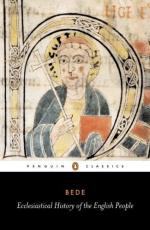|
This section contains 1,400 words (approx. 5 pages at 300 words per page) |

|
SOURCE: F. M. Stenton, "Learning and Literature in Early England," in Anglo-Saxon England, Oxford at the Clarendon Press, 1943, pp. 177-200.
In the following excerpt, Stenton asserts that Bede's greatest talent was his ability to coordinate fragments of information from assorted sources.
Among the men who brought Northumbrian learning out of isolation, Benedict Biscop, the founder of Wearmouth and Jarrow, deserves to be regarded as the leader. In the history of his time he is overshadowed by his younger contemporary Wilfrid. But Wilfrid's contribution to the enlightenment of the north was made in the spheres of ecclesiastical observance and regulation; he was too impatient to create a great monastic school, and his churches of Hexham and Ripon were not remarkable for their learning. Benedict devoted the knowledge and experience of half a lifetime to the establishment of two monasteries. By 674, when Ecgfrith, king of Northumbria, gave him land for...
|
This section contains 1,400 words (approx. 5 pages at 300 words per page) |

|


